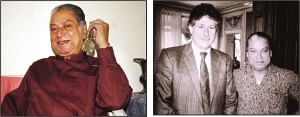Sayeed Ahmad: An icon in the world of drama

Sayeed Ahmad, (L) Sayeed Ahmad with Edward Said(R)Photo: STAR
Sayeed Ahmed, who began his career in London as a musician for BBC, is today the toast of the city, as a nonpareil dramatist, who recently got the Shilpakala Academy Award for drama.
Writing ceaselessly in Dhaka and Lahore in his youth, he mastered the world of the stage -- and won accolades both at home and overseas, such as the 'Legion d'Honneur'. He is well-known to the BTV audience for his “Bishwa Natok” where he introduces and directs plays of international fame. He has rubbed shoulders with Eugenio Barba, Edward Said, Gunter Grasse and other legendary litterateurs. Although his vision is a global one, he never loses sight of his roots in Bangladesh. His own contributions include five unique plays, but his impact on our theatre is overwhelming, and his knowledge of the arts is boundless.
What is most important in a play -- the theme, the plot, the acting, directing or, lastly but not the least, the audience? “I try to address subjects of universal appeal, with Bangladeshi at the core of course. I try to express my own culture but try not to be bounded by borders. I've endeavoured to break barriers but also communicate with other cultures,” says Ahmed.
His plays have been staged in the US, Italy, Germany, Scandinavia, India and Pakistan.
Why is it that in the '60s and '70s the plays on TV were powerful, whereas, today, they most often pale in comparison? There is not much depth usually, unless the plays are based on the classics.
To this Ahmad says that they are topical but our palettes have deteriorated. TV plays nowadays often bear a mushy romantic theme, and usually have a happy ending like the popular Bollywood productions. Our plays tend to copy from our neighbours.
Sayeed Ahmed, himself, is able to view life in its totality. He thinks of human reaction to situations in context of the cultural background. Yet again, he adds, that a human being is an unpredictable one, who is not always consistent with his environment. One is subjected, rather to so many elements -- from which he/she brings either misfortune to himself or his country or otherwise. Thus, he believes that one's fate is dictated by one's surroundings. Playwrights today are often imitating blindly without going deep into the philosophy of life, he feels.
Why have the stage plays been always impressive in Bangladesh when what we can afford to see more readily are TV plays, which are so different in quality? Ahmad says that the small screen is catering more to entertainment, and the stage is more a motivational media for people to understand and maybe change their society. Thus, issues come up on stage, which are not addressed on TV; issues that are connected more with higher level of life and thinking.

 For all latest news, follow The Daily Star's Google News channel.
For all latest news, follow The Daily Star's Google News channel. 


Comments